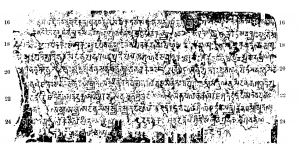


(Ll. 1-2) Hail! From the (royal) grant (agrahâra) of Ambila village, our Head of the District (Vishayapati) Chhattramaha, with confidence intimates, addresses in writing and informs the Court (Adhikaraṇa), as well as the Brâhmaṇas, the chief officers and others, and also the householders at the village of Jangôyikâ, after having enquired about their well-being:
(Ll. 3-7) “I wish to make over, for the sake of the increase of my religious merit, 4 kulyavâpas of fallow land, after (it) has been purchased, to the Brâhmaṇa …….. svâmin, an inhabitant of the agrahâra of Khaṭâpûraṇa in Nanda–vîthî, belonging to the Kâśyapa-gôttra and the Chhândônga(-charaṇa of the Sânavêda), to enable him to perform the Five Great Sacrifices. Now, in your District (vishaya) there is established the system of sale at the rate of two dînâras per each kulyavâpa of fallow land, originally devoid of vegetation, which does not, yield any revenue (to the State) and being under perpetual endowment (akshaya-nîvî) eternally, as long as the moon, the sun and the stars endure. So you should accept from me eight dînâras and grant (me) by means of a copper-plate, for the sake of perpetual endowment, four kulyavâpas of fallow land in the village of Jangôyikâ.”
(Ll. 8-11) Whereas it has been ascertained on enquiry by the Record-keepers, Pradyôtasimha and Bandhudâsa, that there is established in this District the system of sale at the rate of two dînâras per each kulyavâpa of fallow land, originally devoid of vegetation, which does not yield any revenue (to the State), and whereas there can be no loss in income to the Crown in such sale of revenue-free fallow land—rather in case of gift a sixth part of the religious merit would accrue to the King (Paramabhaṭṭâraka-pâda)—now therefore let (the land) be granted.
(Ll. 11-13) So having realized eight dînâras from the Head of the District, Chhattramaha, four kulyavâpas of fallow land, ku 4, is being granted in the village of Jangôyikâ, (the land being bounded) on the south by (the plot granted by) a copper-plate charter to Gôrakshita and on the west by Gôpâhbhôga.
(Ll. 13-16) Therefore known this, you should give away (the plot) in a land that may not cause hindrance to cultivation of householders, after measuring (it) by (the standard unit of) 89 reeds, according to the cubit length of Darvvîkarmma, and also after demarcating the area in four directions by permanent marks of chaff, charcoal, etc.
(Ll. 15-16) And having made over you should still maintain (it) for ever, under the operation of the principle of perpetual endowment (Akshaya-nîvî). Likewise, it should be maintained, out of regard for piety, by the present and future administrative officers as well. And so says Lord Vyâsa. (Here follow two imprecatory verses.)
(L. 19) The year 169, the 8th day of the bright half of Vai(śâkha).